The Power Supply Unit (PSU) is one of the most crucial components of a PC. As long as PSU is working fine, people don’t pay much attention to it compared to other components, such as the CPU, Graphics Card, RAM, and SSD. It is also because almost all PSUs (even high-end ones) in the market do not come with temperature sensors, power sensors, or fan speed sensors for monitoring through software in the operating system. They only have sensors for their built-in protection mechanism. However, there are some power supplies available in the market that come with sensors for monitoring purposes in the Windows OS. These power supplies have a communication port (USB Mini B/ USB Type-C/4-pin COM) from where it connects to the motherboard’s USB header through the supplied cable. Using the supported software, you can easily monitor the performance, power consumption, temperature, PSU fan speed, and other critical parameters in real-time.
USB Port in Select Power Supplies
Below you can see the Mini USB (Type-B) / USB Type-C ports on the power supplies that support hardware monitoring through software.
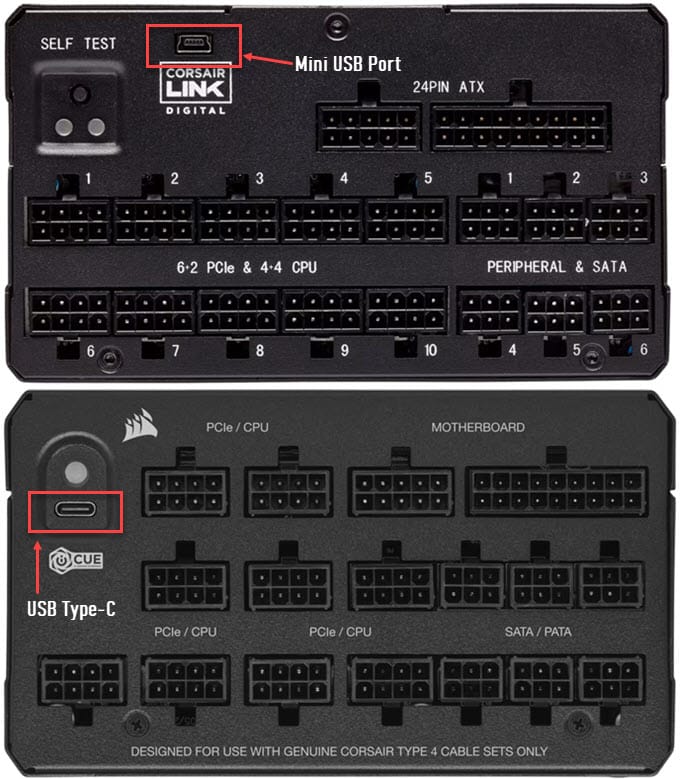
Mini USB (Type-B) to 9-pin Motherboard USB Header Cable
Below you can see a Mini USB to Motherboard USB Header Cable that connects the PSU to the motherboard for software-based monitoring.
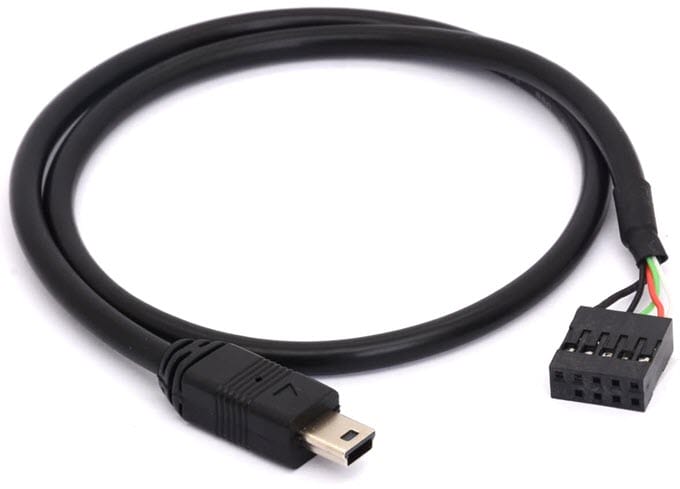
Buy Mini USB to 9-pin Motherboard USB Cable
Monitoring Critical Parameters using Software
Below, you can see the Corsair iCUE software and Thermaltake TT RGB software, which are used for software-controlled monitoring of their supported PSUs.
Corsair iCUE Software (Corsair LINK)
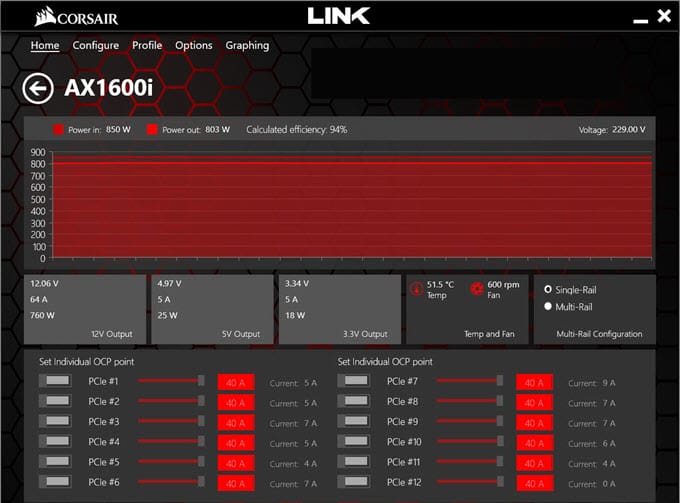
Thermaltake TT RGB Software
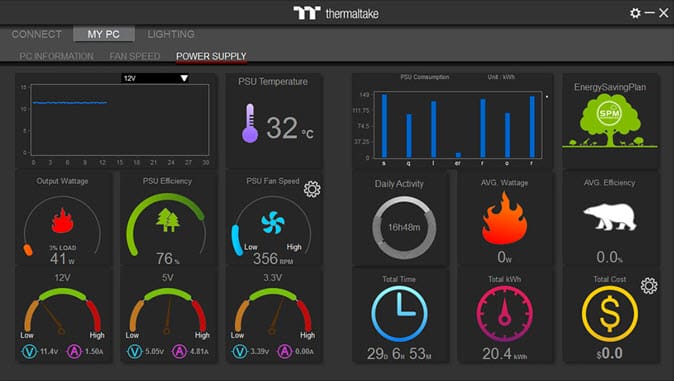
How to Monitor the Temperature of a PSU with a Temperature Sensor?
Install the power supply in your PC and then connect the USB cable to the PSU and motherboard. After that, install the supported software in Windows. Open the software and go to the power supply section, where you can see all the critical parameters of the PSU for real-time monitoring.
List of Power Supplies with Software Monitoring
Below is the list of power supplies with temperature and power monitoring functionality. These PSUs come with a USB or Communication (COM) port that connects to the motherboard’s USB header for enabling the supported software to monitor the power supply’s critical parameters, including temperature, voltage, current, fan speed, and power in real time. Moreover, almost all the below-listed PSUs are ATX 3.1 Specs compatible and come with a 12V-2×6 power connector for the latest graphics cards.
Corsair
All Corsair PSUs with the suffix i after the series name, e.g., RMi, HXi, and AXi, have the option for digital monitoring with Corsair’s iCue software. Just have to connect the cable between the PSU and a USB header on the motherboard and install iCUE software.
- Corsair AX1600i Digital ATX Power Supply — 1600 Watt Fully-Modular PSU
- Corsair AX860i Digital ATX Power Supply — 860 Watt 80 PLUS PLATINUM Certified Fully-Modular PSU
- Corsair HX1000i Fully Modular Ultra-Low Noise Platinum ATX 1000 Watt PC Power Supply
- Corsair HXi Series HX850i High-Performance ATX Power Supply — 850 Watt 80 Plus PLATINUM Certified PSU
- Corsair HXi Series HX1500i Fully Modular Ultra-Low Noise Platinum ATX 1500 Watt PC Power Supply
- Corsair HXi Series HX1200i Fully Modular Ultra-Low Noise Platinum ATX 1200 Watt PC Power Supply
- Corsair HXi Series HX750i High-Performance ATX Power Supply — 750 Watt 80 Plus PLATINUM Certified PSU
MSI
Gigabyte
- Gigabyte AORUS P1200W 80+ PLATINUM MODULAR Power Supply
Thermaltake
All power supplies with the words ‘iRGB’ and ‘DPS’ in their model names can be monitored through Thermaltake’s software, e.g., Thermaltake Toughpower iRGB PLUS 1000W Gold and Thermaltake Toughpower DPS G RGB 750W Gold.
- Thermaltake Toughpower iRGB PLUS 1650W Titanium – TT Premium Edition
- Thermaltake Toughpower iRGB PLUS 1250W Titanium – TT Premium Edition
- Thermaltake Toughpower iRGB PLUS 1000W Gold – TT Premium Edition
- Thermaltake Toughpower iRGB PLUS 850W Gold – TT Premium Edition
- Thermaltake Toughpower iRGB PLUS 750W Gold – TT Premium Edition
- Thermaltake Toughpower iRGB PLUS 850W Platinum – TT Premium Edition
- Thermaltake Toughpower iRGB PLUS 1050W Platinum – TT Premium Edition
- Thermaltake Toughpower iRGB PLUS 1200W Platinum – TT Premium Edition
- Thermaltake Toughpower iRGB PLUS 1250W Titanium
- Thermaltake Toughpower DPS G RGB 850W Titanium
- Thermaltake Toughpower DPS G RGB 1000W Titanium
- Thermaltake Toughpower DPS G RGB 1500W Titanium
- Thermaltake Toughpower DPS G RGB 650W Gold
- Thermaltake Toughpower DPS G RGB 750W Gold
- Thermaltake Toughpower DPS G RGB 850W Gold
- Thermaltake Toughpower DPS G RGB 1250W Titanium
- Thermaltake Toughpower DPS G 850W Platinum
- Thermaltake Smart DPS G 600W Bronze
- Thermaltake Smart DPS G 700w Bronze
- Thermaltake Smart DPS G 650W Gold
- Thermaltake Smart DPS G 750W Gold
- Thermaltake Toughpower DPS 850W
- Thermaltake Toughpower DPS 750W
Final Words
Monitoring Power Supply Unit critical parameters may not be of an important concern for most users, even including the advanced ones, but for enthusiasts, it can be. Monitoring the temperature and other critical parameters of a PSU can reveal information about the computer’s power draw and the overall health and well-being of your power supply. If you have any doubts or would like to share something on this topic, please let me know your queries and suggestions in the comment section below.
(*This post may contain affiliate links, which means I may receive a small commission if you choose to purchase through the links I provide (at no extra cost to you). Thank you for supporting the work I put into this site!)
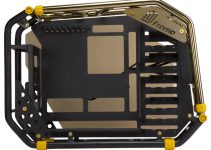
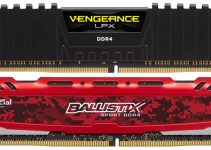
![Best Z590 Motherboards for Intel 11th Gen CPU [Budget to High-end] Best Z590 Motherboards for Intel 11th Gen CPU [Budget to High-end]](https://graphicscardhub.com/wp-content/uploads/2021/04/GIGABYTE-Z590-AORUS-MASTER-211x150.jpg)